 Backend Development
Backend Development PHP Tutorial
PHP Tutorial How to build a Docker development environment for Laravel yourself
How to build a Docker development environment for Laravel yourselfThe content of this article is about setting up a Docker development environment for Laravel. It has certain reference value. Friends in need can refer to it.
I haven’t written anything for a long time. Today I will talk about how to build a Docker environment for Laravel to run.
The most famous one on the market is "laradock" https://github.com/laradock/laradock
Docker PHP development environment.
Usage reference: http:/ /laradock.io
Since it is "self-built", we can refer to this to minimize the needs for Laravel operation.
The following are the basic conditions I listed:
Software: PHP 7.2, Nginx, MySQL, Composer, NPM or Yarn, etc.;
Use domestic mirroring;
Docker-Compose
To achieve scalability, just like "laradock", use the Docker-Compose orchestration method to assemble several core images together .
php-fpm
Here we are using the "DaoCloud" accelerated image -
7.2-fpm-alpine.
This version uses both the PHP 7.2 version and the
minimized system. Based on this, you can install additional tools required for the environment: such as, composer, nodejs, python, yarn, etc. <pre class="brush:php;toolbar:false">FROM daocloud.io/php:7.2-fpm-alpine
MAINTAINER coding01 <yemeishu>
RUN sed -i 's/dl-cdn.alpinelinux.org/mirrors.aliyun.com/g' /etc/apk/repositories
RUN apk add --no-cache --virtual .build-deps \
$PHPIZE_DEPS \
curl-dev \
imagemagick-dev \
libtool \
libxml2-dev \
postgresql-dev \
sqlite-dev \
&& apk add --no-cache \
curl \
git \
imagemagick \
mysql-client \
postgresql-libs \
&& pecl install imagick \
&& docker-php-ext-enable imagick \
&& docker-php-ext-install \
curl \
iconv \
mbstring \
pdo \
pdo_mysql \
pdo_pgsql \
pdo_sqlite \
pcntl \
tokenizer \
xml \
zip \
&& curl -s https://getcomposer.org/installer | php -- --install-dir=/usr/local/bin/ --filename=composer \
&& apk del -f .build-deps
# 修改 composer 为国内镜像
RUN composer config -g repo.packagist composer https://packagist.laravel-china.org
# install prestissimo
RUN composer global require "hirak/prestissimo"
# install laravel envoy
RUN composer global require "laravel/envoy"
#install laravel installer
RUN composer global require "laravel/installer"
RUN sed -i 's/dl-cdn.alpinelinux.org/mirrors.aliyun.com/g' /etc/apk/repositories
RUN apk update && apk add -u nodejs libpng-dev python
ENV PATH /root/.yarn/bin:$PATH
RUN apk update \
&& apk add curl bash binutils tar \
&& rm -rf /var/cache/apk/* \
&& /bin/bash \
&& touch ~/.bashrc \
&& curl -o- -L https://yarnpkg.com/install.sh | bash \
&& yarn config set registry 'https://registry.npm.taobao.org' \
&& npm install -g cnpm --registry=https://registry.npm.taobao.org
WORKDIR /var/www</yemeishu></pre>In which to install the alpine system plug-in, we use the
Alibaba Cloud mirror. php:7.2-fpm-alpine For specific usage, please refer to: https://dashboard.daocloud.io/packages/019c8dce-ec80-4468-bddc-254fc62ef5c7
nginxWe use
, mainly to load the website configuration file into
nginx. <pre class="brush:php;toolbar:false">FROM daocloud.io/nginx:1.13-alpine
MAINTAINER coding01 <yemeishu>
ADD vhost.conf /etc/nginx/conf.d/default.conf
WORKDIR /var/www</yemeishu></pre>The rest is to connect these images. Finally, take a look at docker-compose.yml File content:
version: '2' services: # The Application app: build: context: ./ dockerfile: app.dockerfile working_dir: /var/www volumes: - ../:/var/www environment: - "DB_PORT=3306" - "DB_HOST=database" - "REDIS_HOST=redis" - "REDIS_PORT=6379" # The Web Server web: build: context: ./ dockerfile: web.dockerfile working_dir: /var/www volumes_from: - app ports: - 8080:80 # The Database database: image: daocloud.io/mysql:5.7.4 volumes: - dbdata:/var/lib/mysql environment: - "MYSQL_DATABASE=homestead" - "MYSQL_USER=homestead" - "MYSQL_PASSWORD=secret" - "MYSQL_ROOT_PASSWORD=secret" ports: - "3306:3306" redis: image: daocloud.io/library/redis:4.0.10-alpine command: redis-server --appendonly yes volumes: dbdata:
Test it againCreate Laravel project
composer create-project laravel/laravel demoNote:
For testing, you can delete the
vendor folder and the composer.lock file. git cloneIn the same folder as the
project,
git clone our self-built "laraveldocker": <pre class="brush:php;toolbar:false">git clone https://github.com/fanly/laraveldocker.git</pre>Modify docker-compose.ymlExecute our project with the path of the
file:
app: build: context: ./ dockerfile: app.dockerfile working_dir: /var/www volumes: - ../:/var/www
buildin
Execute the build command under:
docker-compose up
The whole speed is quite fast
Next enter the container
docker exec -it de075c525528 bash
Let’s see the effect of installing the plug-in:
Using  https:/ /packagist.laravel-china.org
https:/ /packagist.laravel-china.org
Domestic mirror.
Note: This mirror is a public welfare project jointly launched by the Laravel China community, Youpaiyun and Youfanyuanyang, aiming to provide stable and high-speed Composer domestic mirroring services for the majority of PHP users. It is recommended to use
USEcnpmyarn
or
Install plugin:
Generate  Laravel key secret
Laravel key secret
:
cp .env.example .env php artisan key:generate Application key [base64:4A7VK6MEX7FakPLDSLji97kz/nyWUAWhW4wYn3gefsY=] set successfully.
Run Let’s take a look at the effect:
.env :
:
DB_CONNECTION=mysql DB_HOST=database DB_PORT=3306 DB_DATABASE=homestead DB_USERNAME=homestead DB_PASSWORD=secret
We use php artisan make: auth to generate layout, registration and login views and routes for all authentication interfaces. At the same time, it will also generate
to handle the application’s login request. Use php artisan migrate to load data.
Let’s take a look at the data table:
At this point, it shows that we are connected MySQL
MySQL
The database is OK.
SummaryIn the learning process, it is best to use the Dockerfile made by others. Although it can be used directly, it would be best if it can be self-sufficient. .
You can also learn more by building your own docker development environment. In the future, we will continue to improve and minimize it to meet development needs.
Related recommendations:
Parsing of URL access patterns in TP5
The above is the detailed content of How to build a Docker development environment for Laravel yourself. For more information, please follow other related articles on the PHP Chinese website!
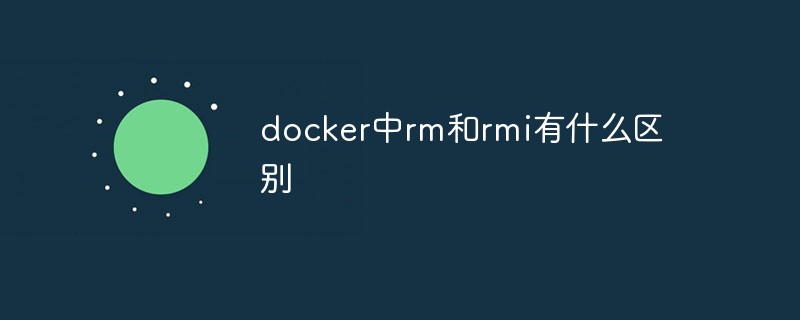 docker中rm和rmi有什么区别Jul 14, 2022 am 11:02 AM
docker中rm和rmi有什么区别Jul 14, 2022 am 11:02 AMdocker中rm和rmi的区别:rm命令用于删除一个或者多个容器,而rmi命令用于删除一个或者多个镜像;rm命令的语法为“docker rm [OPTIONS] CONTAINER [CONTAINER...]”,rmi命令的语法为“docker rmi [OPTIONS] IMAGE [IMAGE...]”。
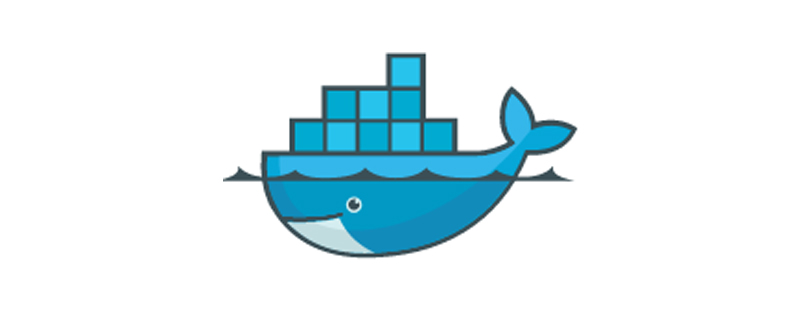 docker官方镜像有哪些May 12, 2022 pm 02:23 PM
docker官方镜像有哪些May 12, 2022 pm 02:23 PMdocker官方镜像有:1、nginx,一个高性能的HTTP和反向代理服务;2、alpine,一个面向安全应用的轻量级Linux发行版;3、busybox,一个集成了三百多个常用Linux命令和工具的软件;4、ubuntu;5、PHP等等。
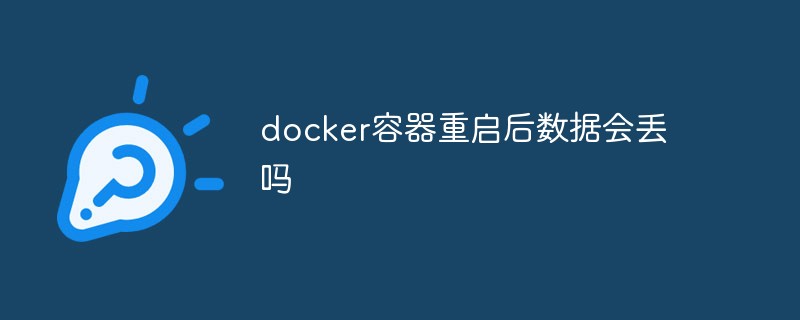 docker容器重启后数据会丢吗Jun 17, 2022 am 10:41 AM
docker容器重启后数据会丢吗Jun 17, 2022 am 10:41 AMdocker容器重启后数据会丢失的;但是可以利用volume或者“data container”来实现数据持久化,在容器关闭之后可以利用“-v”或者“–volumes-from”重新使用以前的数据,docker也可挂载宿主机磁盘目录,用来永久存储数据。
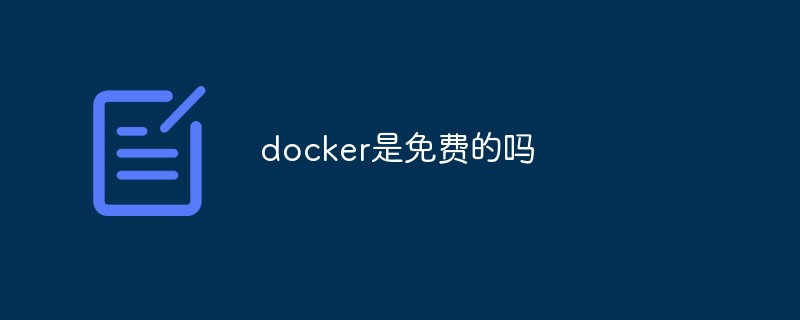 docker是免费的吗Jul 08, 2022 am 11:21 AM
docker是免费的吗Jul 08, 2022 am 11:21 AMdocker对于小型企业、个人、教育和非商业开源项目来说是免费的;2021年8月31日,docker宣布“Docker Desktop”将转变“Docker Personal”,将只免费提供给小型企业、个人、教育和非商业开源项目使用,对于其他用例则需要付费订阅。
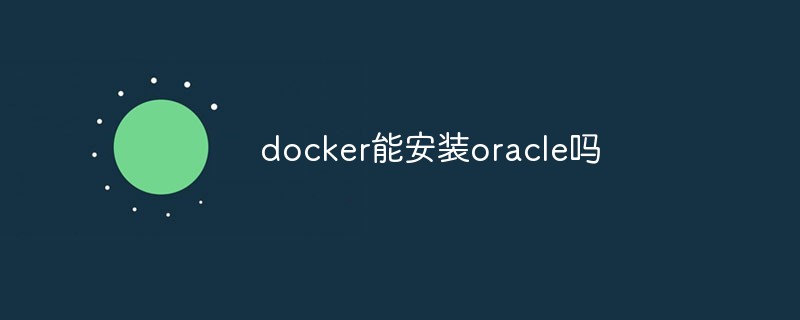 docker能安装oracle吗Jul 08, 2022 pm 04:07 PM
docker能安装oracle吗Jul 08, 2022 pm 04:07 PMdocker能安装oracle。安装方法:1、拉取Oracle官方镜像,可以利用“docker images”查看镜像;2、启动容器后利用“docker exec -it oracle11g bash”进入容器,并且编辑环境变量;3、利用“sqlplus /nolog”进入oracle命令行即可。
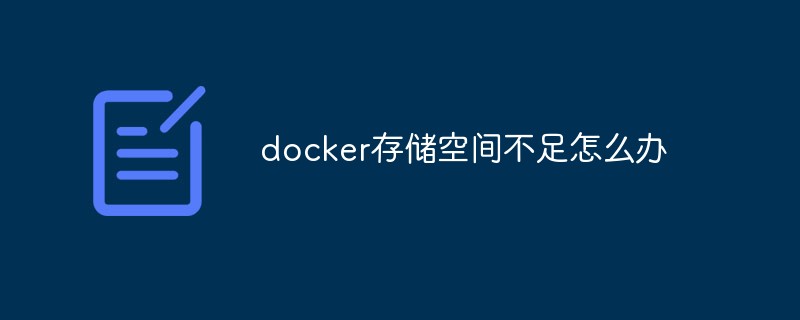 docker存储空间不足怎么办Jul 22, 2022 pm 03:44 PM
docker存储空间不足怎么办Jul 22, 2022 pm 03:44 PM解决方法:1、停止docker服务后,利用“rsync -avz /var/lib/docker 大磁盘目录/docker/lib/”将docker迁移到大容量磁盘中;2、编辑“/etc/docker/daemon.json”添加指定参数,将docker的目录迁移绑定;3、重载和重启docker服务即可。
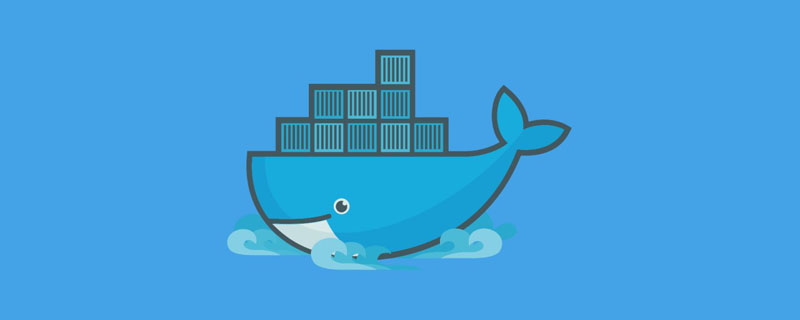 什么是docker最早支持的存储引擎May 12, 2022 pm 03:27 PM
什么是docker最早支持的存储引擎May 12, 2022 pm 03:27 PMAUFS是docker最早支持的存储引擎。AUFS是一种Union File System,是文件级的存储驱动,是Docker早期用的存储驱动,是Docker18.06版本之前,Ubuntu14.04版本前推荐的,支持xfs、ext4文件。
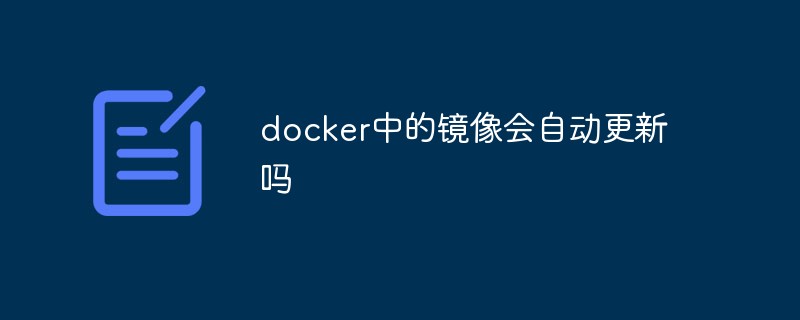 docker中的镜像会自动更新吗Jun 22, 2022 pm 04:23 PM
docker中的镜像会自动更新吗Jun 22, 2022 pm 04:23 PMdocker中的镜像会自动更新;可以利用Watchtower工具来自动更新镜像,Watchtower是一个可以监控正在运行的容器镜像是否更新的工具,当本地镜像与远程镜像有差异的时候,可以自动使用当前容器的运行参数以新镜像重新创建一个新的容器,并删除旧的容器。


Hot AI Tools

Undresser.AI Undress
AI-powered app for creating realistic nude photos

AI Clothes Remover
Online AI tool for removing clothes from photos.

Undress AI Tool
Undress images for free

Clothoff.io
AI clothes remover

AI Hentai Generator
Generate AI Hentai for free.

Hot Article

Hot Tools

SublimeText3 Chinese version
Chinese version, very easy to use

MantisBT
Mantis is an easy-to-deploy web-based defect tracking tool designed to aid in product defect tracking. It requires PHP, MySQL and a web server. Check out our demo and hosting services.

MinGW - Minimalist GNU for Windows
This project is in the process of being migrated to osdn.net/projects/mingw, you can continue to follow us there. MinGW: A native Windows port of the GNU Compiler Collection (GCC), freely distributable import libraries and header files for building native Windows applications; includes extensions to the MSVC runtime to support C99 functionality. All MinGW software can run on 64-bit Windows platforms.

Zend Studio 13.0.1
Powerful PHP integrated development environment

SublimeText3 Mac version
God-level code editing software (SublimeText3)






